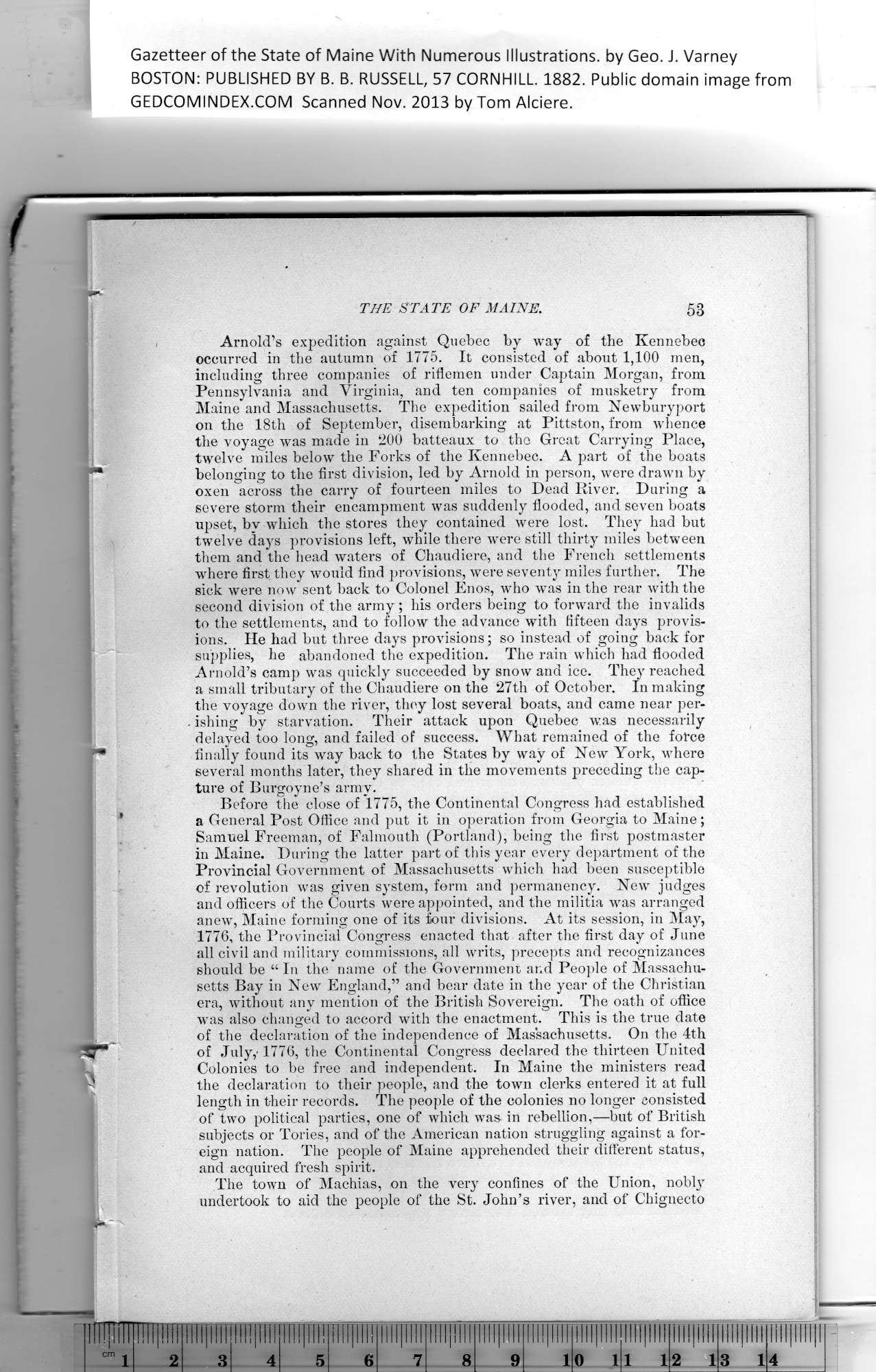|
Gazetteer of the State of Maine With Numerous Illustrations, by Geo. J. Varney
BOSTON: PUBLISHED BY B. B. RUSSELL, 57 CORNHILL. 1882. Public domain image from
THE STATE OF MAINE. 53
Arnold’s expedition against Quebec by way of tbe Kennebec
occurred in the autumn of 1775. It consisted of about 1,100 men,
including three companies of riflemen under Captain Morgan, from
Pennsylvania and Virginia, and ten companies of musketry from
Maine and Massachusetts. The expedition sailed from Newburyport
on the 18th of September, disembarking at Pittston, from whence
the voyage was made in 200 batteaux to the Great Carrying Place,
twelve miles below the Forks of the Kennebec. A part of the boats
belonging to the first division, led by Arnold in person, were drawn by
oxen across the carry of fourteen miles to Dead River. During a
severe storm their encampment was suddenly flooded, and seven boats
upset, by which tbe stores they contained were lost. They had but
twelve days provisions left, while there were still thirty miles between
them and the head waters of Chaudiere, and the French settlements
where first they would find provisions, were seventy miles further. The
sick were now sent back to Colonel Enos, who was in the rear with the
second division of the army; his orders being to forward the invalids
to the settlements, and to follow the advance with fifteen days provis-
ions. He had but three days provisions; so instead of going back for
supplies, he abandoned the expedition. The rain which had flooded
Arnold’s camp was quickly succeeded by snow and ice. They reached
a small tributary of the Chaudiere on the 27th of October. In making
the voyage down the river, they lost several boats, and came near per-
. ishing by starvation. Their attack upon Quebec wras necessarily
delayed too long, and failed of success. What remained of the force
finally found its way back to the States by way of New York, where
several months later, they shared in the movements preceding the cap-
ture of Burgoyne’s army.
Before the close of 1775, the Continental Congress had established
1 a General Post Office and put it in operation from Georgia to Maine;
Samuel Freeman, of Falmouth (Portland), being the first postmaster
in Maine. During the latter part of this year every department of the
Provincial Government of Massachusetts which had been susceptible
of revolution was given system, form and permanency. New judges
and officers of the Courts were appointed, and the militia was arranged
anew, Maine forming one of its four divisions. At its session, in May,
1776, the Provincial Congress enacted that after the first day of June
all civil and military commissions, all writs, precepts and recognizances
should be “ In the name of the Government and People of Massachu-
setts Bay in New England,” and bear date in the year of the Christian
era, without any mention of the British Sovereign. The oath of office
was also changed to accord with the enactment. This is the true date
of the declaration of the independence of Massachusetts. On the 4th
of July,' 1776, the Continental Congress declared the thirteen United
L Colonies to be free and independent. In Maine the ministers read
the declaration to their people, and the town clerks entered it at full
length in their records. The people of the colonies no longer consisted
of two political parties, one of which was in rebellion,—but of British
subjects or Tories, and of the American nation struggling against a for-
eign nation. The people of Maine apprehended their different status,
and acquired fresh spirit.
The town of Machias, on the very confines of the Union, nobly
undertook to aid the people of the St. John’s river, and of Chignecto
<1-* ~
PREVIOUS PAGE ... NEXT PAGE
This page was written in HTML using a program written in Python 3.2
|
